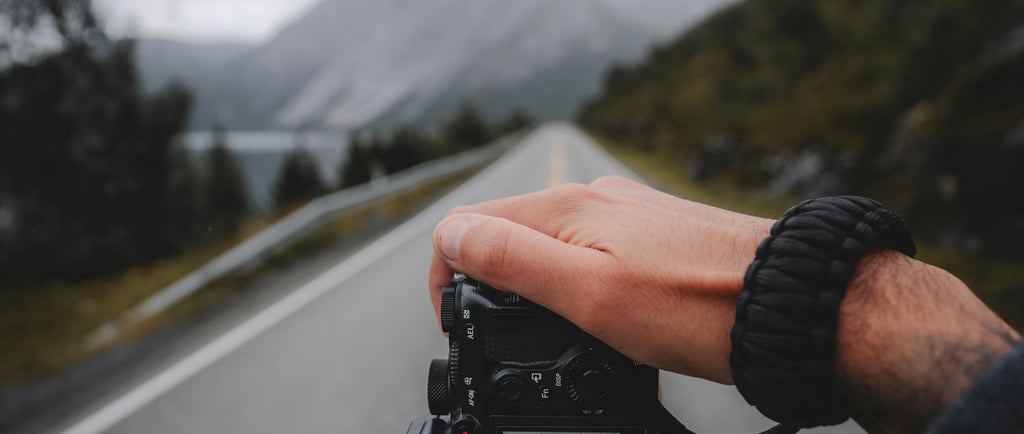How to Choose the Perfect Digital Camera: A Guide for Every Type of Photographer
PHOTOGRAPHY
Mark Fenech
1/14/20254 min read


As a 26-year-old self-taught photographer, I’ve spent years experimenting with different cameras, learning their quirks, and figuring out what works best for me. If you’re in the market for a new digital camera, you might feel overwhelmed by the options out there. Whether you’re a hobbyist, aspiring professional, or travel enthusiast, finding the right camera can make all the difference. Here’s a guide to help you choose the perfect digital camera based on your style and needs.
1. Know Your Photography Style
Before you start looking at cameras, ask yourself: What kind of photography do I enjoy most? Are you drawn to landscapes, portraits, street photography, or maybe wildlife shots? The type of photography you plan to do will significantly impact the kind of camera that’s right for you.
• Landscape Photography: If you love capturing wide, sweeping views, look for a camera with a high-resolution sensor and great dynamic range. A full-frame DSLR or mirrorless camera will give you exceptional image quality and more control over depth of field.
• Portrait Photography: For portraits, you’ll want a camera with a good autofocus system and the ability to achieve a shallow depth of field. A camera with a large sensor (like APS-C or full-frame) will allow for beautiful bokeh and sharp focus.
• Street Photography: If you’re always on the move and need something lightweight and fast, a compact mirrorless camera or a high-end point-and-shoot might be perfect. Look for something with fast autofocus and good low-light performance.
• Wildlife Photography: For capturing animals in action, you’ll need a camera with fast autofocus, burst shooting capabilities, and a decent zoom lens. A DSLR or mirrorless camera with a crop sensor can give you the extra reach you need.
2. Understand the Camera Types
There are several camera types to consider, each suited to different needs and preferences. Here’s a breakdown:
• DSLR Cameras: These cameras are ideal for those who want full control over their settings and need flexibility with interchangeable lenses. They’re larger and heavier but offer excellent image quality and a wide variety of lenses.
• Mirrorless Cameras: Mirrorless cameras are similar to DSLRs in terms of quality and performance but are smaller and lighter due to the lack of a mirror mechanism. They’ve become incredibly popular for both hobbyists and professionals because of their portability and versatility.
• Point-and-Shoot Cameras: If you’re looking for something more compact and convenient, point-and-shoots are a great option. These cameras are easy to use and perfect for travel or casual photography, though they may lack the flexibility of interchangeable lenses.
• Action Cameras: If you’re into extreme sports or need something rugged, an action camera like a GoPro can capture high-quality video and photos in tough conditions. They’re compact, waterproof, and built for adventure.
3. Megapixels: More Isn’t Always Better
You’ve probably seen cameras boasting mega-high megapixels, but does that always mean better quality? Not necessarily. While a higher megapixel count can be useful for large prints or cropping, the quality of the sensor, lens, and image processing software are more important factors in image quality.
For most types of photography, a camera with 20-30 megapixels is plenty. The key is to find a camera with a sensor that performs well in various lighting conditions.
4. Budget Considerations
Photography gear can get expensive, so it’s important to set a budget that works for you. You don’t need to break the bank to get a good camera. However, keep in mind that quality lenses and accessories (like a tripod, memory cards, and bags) can add to your overall investment.
If you’re just starting out, a more affordable entry-level camera can be perfect. As you grow as a photographer, you can always upgrade your gear. Consider buying used or refurbished models from reputable sources if you want to save some cash without sacrificing quality.
5. Ease of Use vs. Advanced Features
Are you looking for a camera with simple point-and-shoot features, or do you want more advanced controls to tweak settings like shutter speed, aperture, and ISO?
• Beginner: If you’re just starting, a camera with automatic settings or scene modes might be all you need. Cameras with easy-to-use interfaces and good automatic modes (like autofocus and auto-exposure) will help you learn without feeling overwhelmed.
• Intermediate to Advanced: If you’re ready to take your photography to the next level, look for a camera that gives you more control over settings. Manual mode, customizable buttons, and a good viewfinder (or electronic viewfinder) will allow you to push your creative boundaries.
6. Video Capabilities
In today’s world, many photographers also dabble in video. If you plan to shoot video, make sure the camera you choose has 4K video recording, good autofocus during video capture, and decent in-body stabilization. Many mirrorless and DSLR cameras now offer exceptional video quality, which is a huge bonus if you want to experiment with vlogging or cinematic video projects.
7. Brand and Lens Availability
Choosing a camera brand often comes down to personal preference, but also think about lens compatibility. Some brands have a wider selection of lenses, making it easier to find the right lens for your needs. Popular brands like Canon, Nikon, Sony, and Fujifilm have a great range of cameras and lenses to suit all types of photographers.
Final Thoughts
Choosing the right digital camera depends on your individual needs, photography style, and budget. Take time to think about what you truly want from your camera and what will help you improve your photography. There’s no one-size-fits-all answer, but with a bit of research, you’ll be able to find the perfect camera to accompany you on your creative journey.
Remember, the best camera is the one that fits your needs and feels right in your hands. Check out the Canon Cameras Collection and the Digital Cameras Collection on Fen’s Finds for the best in DSLR, Mirrorless, and Point-and-Shoot options. Happy shooting!
A Curated Collective
© 2024-2025 Fen's Finds. All rights reserved.
Fen’s Finds earns from qualifying purchases as an Amazon Associate
